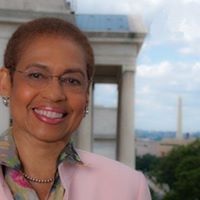In First Trump Spending Bill, Released Today, Norton Prevents Any New Anti-Home Rule Riders, Maintains $40 Million for DCTAG
WASHINGTON, D.C. – (RealEstateRama) — Congresswoman Eleanor Holmes Norton (D-DC) said that, following negotiations with the Republican Congress and the Trump White House, the fiscal year 2017 omnibus appropriations bill, released today, is largely a victory for the District of Columbia. The omnibus, which funds the federal government through September 30, 2017, contains no new anti-home-rule riders; maintains $40 million for Norton’s major priority, the D.C. Tuition Assistance Grant Program (DCTAG), a historic funding amount she secured for the first time in fiscal year 2016; provides the full $150 million for Washington Metropolitan Area Transit Authority (WMATA) capital improvements; exempts D.C. from a shutdown in fiscal year 2018; and provides other critical funding for the District that Norton requested.

“We prepared for the reality that we would be negotiating a major spending bill in the first all-Republican government in over ten years, and, as a result, we were able to protect the District’s major funding priorities and to prevent any new congressional interference into D.C.’s local affairs,” Norton said. “The elephant in the room for the negotiation of the omnibus was Trump’s proposed fiscal year 2017 cuts to the domestic side of the federal budget. D.C. had no new losses, at least in this omnibus, considering full funding for DCTAG, no repeal of D.C.’s budget autonomy referendum, new money for the Department of Homeland Security consolidation at St. Elizabeths, and funding for DC Water to control flooding. Our struggle continues this spring and into the summer as the next appropriations negotiations take shape.”
Norton said securing $40 million for DCTAG was a major victory after the House FY17 D.C. appropriations bill provided only $20 million and the Senate FY17 D.C. appropriations bill provided only $30 million. Norton kept any new D.C. riders from being included in the omnibus bill, but the omnibus does include the same riders that were enacted in fiscal year 2016—prohibiting D.C. from spending its local funds on abortions for low-income women and on commercializing marijuana. The House’s FY17 D.C. appropriations bill, in addition to the abortion and marijuana commercialization funding prohibitions, also would have repealed D.C.’s budget autonomy referendum and prohibited D.C. from spending its local funds on enforcing the Reproductive Health Non-Discrimination Act. Norton also preserved D.C.’s medical aid-in dying law, the Death with Dignity Act, despite threats from Republicans to repeal the law through the appropriations process.
Funding is continued for Department of Homeland Security headquarters consolidation at the St. Elizabeths campus in Ward 8 in the amount of $13.25 million, but Norton was pleased that this amount will not affect the project, because $250 million remains from the $556.7 million she got included in the FY16 omnibus appropriations bill. The leftover funds were a factor in getting an appropriation less than Norton wanted, but she expects to secure additional funding for the project. Particularly after a U.S. Government Accountability Office report released in 2014, Norton said Congress has no alternative but to continue funding the project because it is so close to completion.
Norton got $14 million for the D.C. Water and Sewer Authority (DC Water) for ongoing work to control flooding in the city and clean up the Anacostia and Potomac rivers and Rock Creek, equal to the fiscal year 2016 enacted level. She secured an extra $5 million to combat HIV/AIDS in D.C., equal to the fiscal year 2016 enacted level. The bill provides $450,000 for the Major General David F. Wherley, Jr. District of Columbia National Guard Retention and College Access Program for tuition for D.C. National Guard soldiers, a small increase from equal the fiscal year 2016 enacted level.
The omnibus appropriates D.C.’s fiscal year 2017 local funds for the duration of the omnibus (May 6 – September 30), likely superseding D.C.’s locally-passed budget for that period. Pursuant to the budget autonomy referendum, for the first time since the Home Rule Act of 1973, the local budget passed by the D.C. Council became law last year without congressional approval, after a 30-day congressional review period. However, the omnibus likely supersedes the Council-passed local budget.
The bill also reauthorizes the D.C. school voucher program through FY19.


